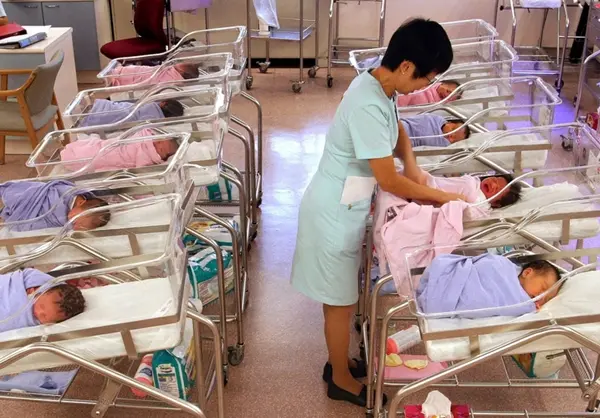**By APD writer Alice **
South Korea is facing a big problem as local people now have fewer babies.
A government report showed the country's total fertility rate last year fell to its lowest since records began.
The total fertility rate measures the average number of children a woman will have in her lifetime. In 2018, this dropped to 0.98 -- or less than one baby per woman, and a drop from the previous year's rate of 1.05.
This means 8.7% fewer babies were born in South Korea in 2018 compared to 2017.
According to the government report, which has been compiled annually since 1970, the fertility rate for women in their late 20s has dropped the sharpest.
This record low puts South Korea near the bottom of lowest fertility rates in the world. It was even lower than Japan, which has struggled with low fertility for years, and a rate of 1.42 in 2018.
To maintain a stable population, countries need a fertility rate of 2 -- anything above that indicates population growth.
This isn't just a fluke for South Korea -- its demographic crisis has been building for a while. The 2017 rate of 1.05 was also a record low at the time, while the mortality rate jumped to a record high.
All the while, the population continues to age. The number of South Koreans over 65 outnumbered youths aged 0 to 14 for the first time in 2017, with the elderly making up 13.6% of all citizens.
Some experts pointed to the declining fertility rate and its economic consequences as a motivator.
There is also an increasing trend among men and women to delay or avoid marriage in both countries. In 2018, a majority of South Koreans aged 20 to 44 were single, according to the Korea Institute for Health and Social Affairs (KIHSA). Among those who were not dating, 51% of men and 64% of women said they were choosing to remain single.
Many of these young South Koreans say they just don't have the time, money, or emotional capacity to go on dates. After all, they are contending with a rising unemployment rate in a highly competitive job market -- meaning many spend their free time in cram schools to earn extra certificates or professional skills.
To deal with this situation, the South Korean government lowered maximum working hours from 68 hours a week to 52 hours last year.
Some college classes and educators are trying to teach students about dating, love and sex in an attempt to reverse the culture against dating -- even assigning students to go on dates.
(ASIA PACIFIC DAILY)
 简体中文
简体中文

